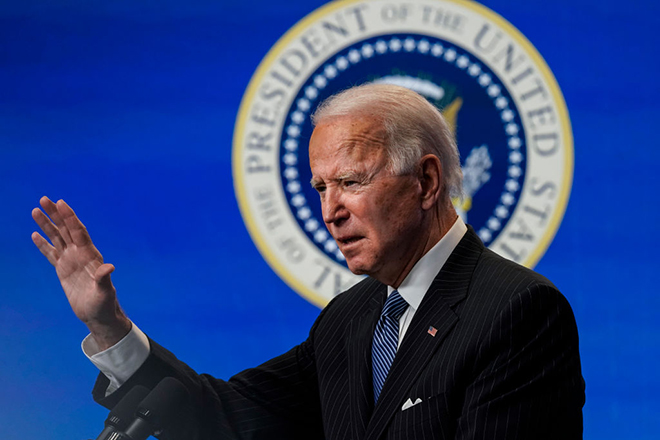S&P Global Offerings
Featured Topics
Featured Products
Events
S&P Global Offerings
Featured Topics
Featured Products
Events
S&P Global Offerings
Featured Topics
Featured Products
Events
Banking & Capital Markets
Economy & Finance
Energy Transition & Sustainability
Technology & Innovation
Podcasts & Newsletters
Banking & Capital Markets
Economy & Finance
Energy Transition & Sustainability
Technology & Innovation
Podcasts & Newsletters
S&P Global Offerings
Featured Topics
Featured Products
Events
25 Jan, 2021
By Donna Young

|
President Joe Biden. |
President Joe Biden has used the power of his pen to order federal agencies to ensure the U.S. is not reliant on foreign nations for protective equipment and essential medical products and supplies when disaster strikes.
The COVID-19 pandemic has highlighted the nation's reliance on foreign suppliers for drugs, vaccines and other medical supplies, like personal protective equipment, such as masks and gowns, and the urgency to have a stronger domestic manufacturing base after many healthcare providers found themselves unable to obtain certain products.
"We can never again be in a position where we have to rely on a foreign country that doesn't share our interest in order to protect our people during a national emergency," Biden said Jan. 25 before signing an executive order under his "Buy American" pledge.
For drugs regulated by the U.S. Food and Drug Administration, 26% of the manufacturing facilities producing active pharmaceutical ingredients are in the U.S., while 19% of those plants are in India and 13% are in China, according to the agency. The remainder are made in other foreign countries.
Biden's new executive action follows a series of orders the president signed Jan. 21 aimed at combating the COVID-19 crisis, in which he called on federal agencies to exercise all appropriate authorities, including using the Defense Production Act, to accelerate manufacturing and other activities to address shortages in equipment and supplies needed for the nation's pandemic response.
Biden's Jan. 25 order calls on the U.S. government, whenever possible, to procure goods, products, materials and services from sources "that will help American businesses compete in strategic industries and help America's workers thrive."
The order also instructs government agencies to promote accountability and transparency in the federal procurement process.
The president also pledged to work with U.S. allies to "make sure they have resilient supply chains as well."
The administration plans to make "historic investments in research and development — hundreds of billions of dollars to sharpen America's innovative edge in markets where global leadership is up for grabs," including biotechnology and artificial intelligence, Biden said.
The president said he intends to ensure that the nearly $600 billion spent annually by the U.S. government in procuring goods and services for keeping the nation safe and secure will support American jobs and businesses.
"The previous administration didn't take it seriously enough," Biden said, saying too often former President Donald Trump's government waived federal buy American requirements "without much pushback at all."
"That is going to change on our watch," Biden said from the White House on Jan. 25.
Under Biden's order, if a federal agency wants to issue a waiver permitting a foreign product to be purchased, "they will have to come to the White House and explain it to us," he said.
The waivers will be publicly posted and then small U.S. manufacturers will be given a chance to say whether they can fill that need, Biden said.
"We are going to use taxpayers' money to rebuild America," he said.
Companies contracting with the federal government will not only be required to make more of their components in the U.S., but the value of those components must contribute to the nation's economy, Biden said. That value will be measured by the number of U.S. jobs created and supported, he added.
'Sustainable resilience'
Each nation must define its own "sustainable resilience," said Ronald Piervincenzi, CEO of United States Pharmacopeia, a global organization that develops quality standards for drugmakers and helps them meet those benchmarks.
|
|
Given the large amount of medicines the U.S. purchases globally and the amount of innovation coming out of the country, it is "quite reasonable to expect the nation to play a significant role in its own drug supply chain," he said.
But until recently, such an objective has been mostly ignored, Piervincenzi said.
Not only are there new efforts being made to boost manufacturing of final drug products in the U.S. but also the ingredients that go into them, he said.
Those onshoring activities have been a boon for the biopharmaceutical industry to modernize its production processes and shift to advanced manufacturing, Piervincenzi said.
"In regulated spaces, sometimes innovations are slow to arrive without a kick," he said, adding that too many drugmakers have relied for far too long on technology that has grown "long in the tooth."
The Pharmaceutical Research and Manufacturers of America — the trade group for innovator biopharmaceutical companies — has said it supports efforts to foster more manufacturing in the U.S. But it said proposals aimed at driving all drug manufacturing to the U.S. "underestimate the significant time, resources and other feasibility challenges and complexities involved."
The fact that Biden pledged Jan. 25 to work with U.S. allies to ensure their supply chains are also resilient should be viewed as a positive sign the president recognizes the reality that it would be unrealistic to think the nation could be completely self-reliant in a global marketplace, Piervincenzi said.
"This is all within the norm," he said. "These are not proposals to no longer buy medicines from anyplace else. Nothing close to that."
